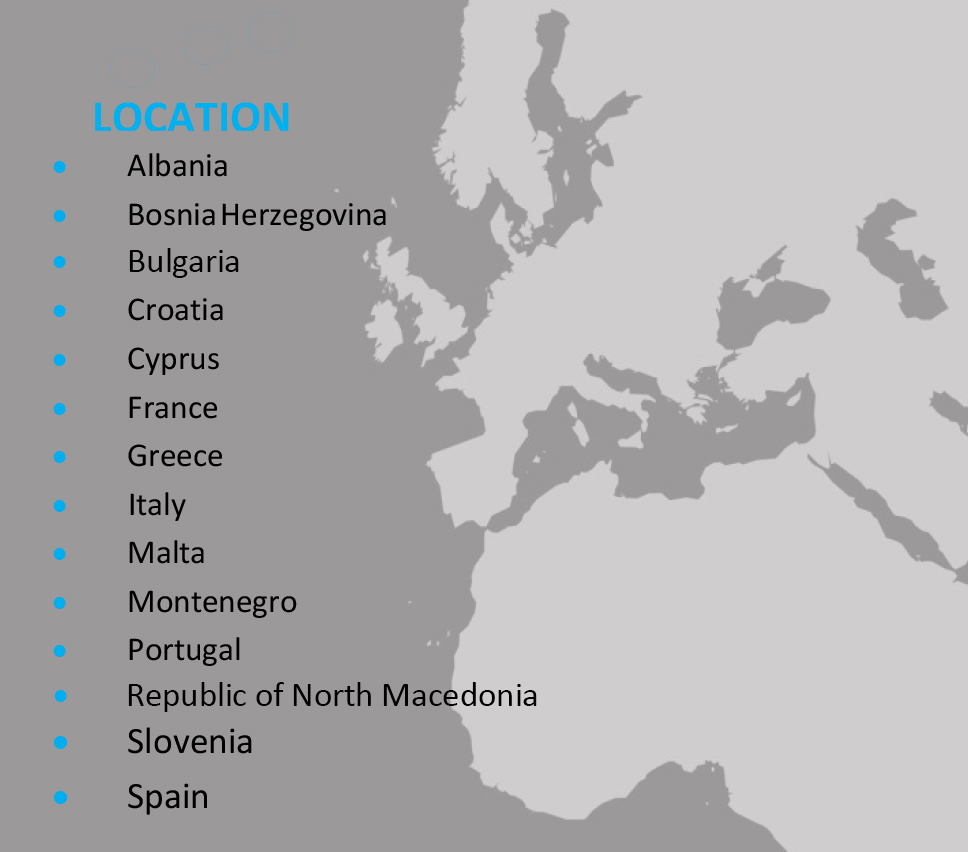
Interreg MED Green Growth community
Context and objectives
The Interreg MED Green Growth community is a network of 14 projects which promote sustainable development in the Northern and Eastern Mediterranean area based on the sound management of the natural resources, taking into account the effects on the labour market by promoting social inclusion and green jobs.
The project aims to promote sustainable growth by fostering innovative concepts and practices and reasonable use of resources, and by supporting social integration through an integrated and territorially based cooperation approach. The Interreg MED Green Growth community started in 2019, and is a thematic community of projects in the framework of the Interreg MED programme, which is a transnational European Territorial Cooperation Programme for the Mediterranean area. It is designed to be an agile network that unifies project results, offers innovative solutions, supports Mediterranean stakeholders and creates a fruitful and collaborative environment. It encompasses 14 projects working on different topics related to green growth such as sustainable agri-food systems, eco-innovation, green manufacturing, green public procurement, waste management and smart cities, among others.
With a total budget of over €34 million and 14 partner countries, the programme aims to improve empowerment of the stakeholders with, within and between existing clusters, economic sectors and networks. More specifically, innovation clusters, value chains and networks throughout MED regions are targeted as direct and indirect beneficiaries of the involved projects. Key target groups are SMEs and structures accompanying them, public authorities, and research structures.
Location

Key figures
Duration:
40 Months
Projects:
14
Total cost:
€34.2m
Countries:
14
Financial contribution
85% co-financed by the European Regional Development Fund within the Interreg MED Programme
15% national co-financing by partner organisations
Promoter
The Interreg MED programme Managing Authority/Joint Secretariat is responsible for managing the programme. It is the entity that signs the subsidy contracts with the Lead partners, while the Joint Secretariat is a transnational team assisting the Managing Authority, the Monitoring Committee and the Audit Authority in implementing the programme. It receives the projects applications and instructs them, provides information to potential beneficiaries about funding under the MED programme and assists beneficiaries in the operations.
Key partners
The national co-financing includes private or public financing that is attributed to each organisation according to national rules of the participating in the Interreg MED Programme countries.
Beneficiaries
- Public authorities: public institutions on national, regional and local level;
- Businesses: key target groups are SMEs and structures accompanying them, public authorities, and research structures; business support organizations;
- Research bodies: research organizations;
- Civil society: NGOs, thematic networks, international organizations, EGTC.
Key actions
Structuring and disseminating a sound message based on the results of the projects for the entire MED community and beyond.
Reaching broader audiences exploiting various communication channels especially via social media tools.
Providing the framework to develop synergies and bring together stakeholders from the quadruple helix (public authorities, industry, academia and civil society) to reinforce dialogue and knowledge exchange on green growth.
Approaching business actors that can build and invest on the ideas emerging from the projects.
Collaborating with external stakeholders and EU projects working in the same field at national, Mediterranean and European level to ensure transnational dissemination and transferability.
Expected Results
Strengthening research, technological development and innovation.
Improved innovation capacities, competitiveness and internationalization of SMEs through thematic transnational events.
Improved cooperation between stakeholders of the quadruple helix (especially between research and businesses) by bridging with actors beyond MED communities and through thematic Working Groups.
Preparation of automated data flows for international reporting agreed in the Mediterranean region.
Strengthened green growth sectors representing important jobs potential through the following tools: transfer of results, integration of tools/results into local policies and/or regulatory framework, transfer of actions.
